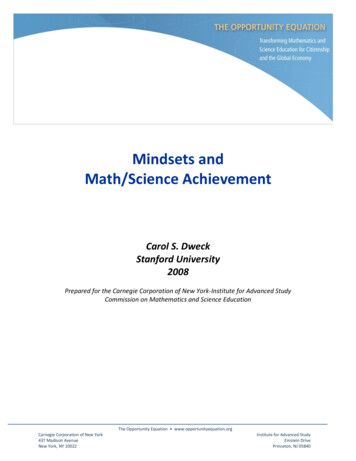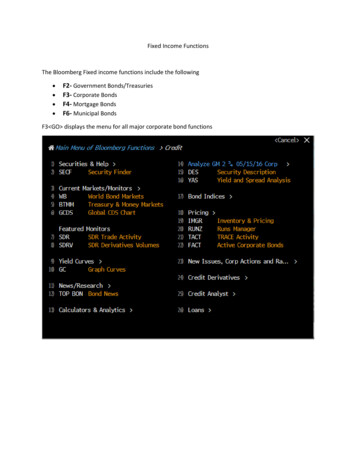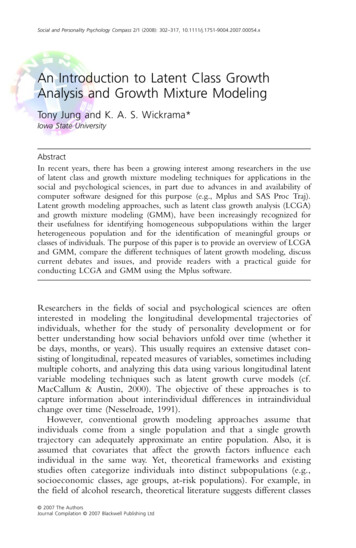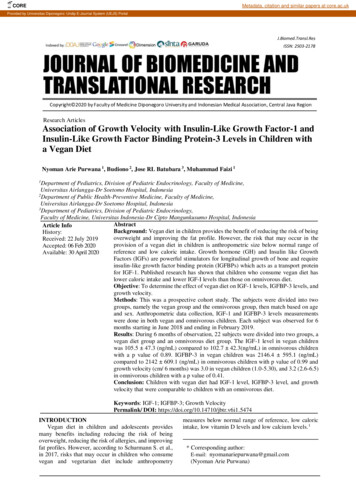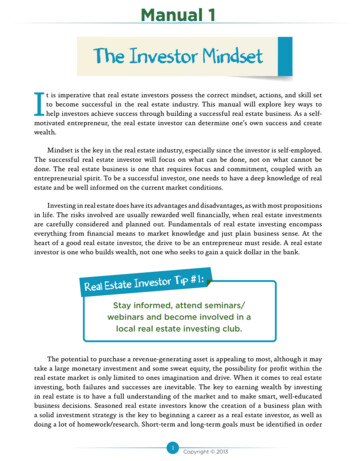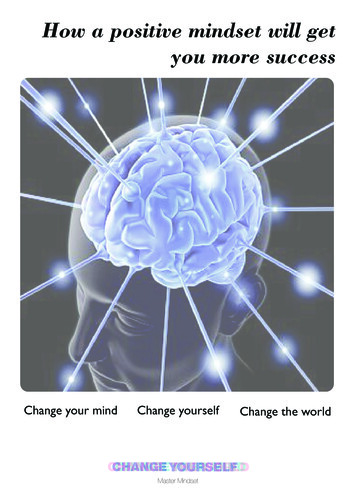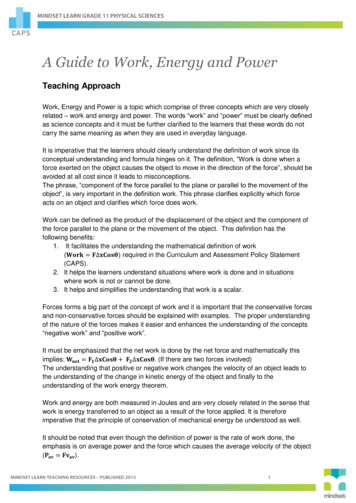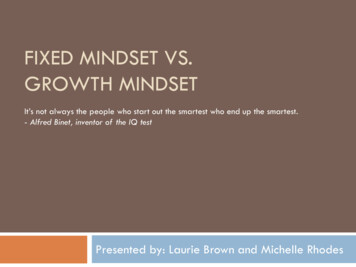
Transcription
FIXED MINDSET VS.GROWTH MINDSETIt’s not always the people who start out the smartest who end up the smartest.- Alfred Binet, inventor of the IQ testPresented by: Laurie Brown and Michelle Rhodes
Agree or Disagree?Look at the following statements with regard to abilityto learn. Do you agree or disagree with each? Your ability to learn is something very basic aboutyou that you can’t change very much You can learn new things, but you can’t reallychange your intelligence Now matter how much intellectual ability you have,you can always change it a bit You really can’t change how intelligent you are
Agree or Disagree?Look at the following statements with regard topersonality and character. Do you agree or disagreewith each? You are a certain kind of person and there is notmuch that can be done to really change that No matter what kind of person you are, you canalways change substantially You can do things differently, but the importantparts of you can’t be changed You can always change basic things about the kindof person you are
Did you know that some praise can actually hinder schoolperformance? that beliefs about where abilities come from havecritical consequences on motivation andachievement?
Mindset is Beliefs about yourself and your most basic qualities Intelligence Talents Personality Some believe these traits are givens, and thatnothing can change thatSome believe that these traits can be developedthrough dedication and effort
Mindset explains Why brains and talent alone don’t bring successHow intelligence can stand in the way of successWhy praising intelligence doesn’t fosteraccomplishment, but jeopardizes itHow teaching a simple idea about the brain canraise grades and productivity
Fixed vs. Growth Mindset “The key [to achievement], isn’t ability; it’s whetheryou look at ability as something inherent that needsto be demonstrated or as something that can bedeveloped”Fixed mindset – intelligence is staticGrowth mindset – intelligence can be developed“You’re smart” vs. “You tried so hard”Carol Dweck, professorof psychology atStanford University
Fixed Mindset Belief that basic qualities, like intelligence, are fixedtraitsSpend time admiring accomplishments instead ofdeveloping furtherBelief that talent alone creates success – withouteffortCarol Dweck, professorof psychology atStanford University
Growth mindset Belief that basic abilities can be developed throughhard work and effortBrains and talent are a starting point to successCreates a love of learning and resilienceCarol Dweck, professorof psychology atStanford University
Why Growth Mindset? Video– Carol Dweck on praise Kids who have a growth mindset Embracechallenge Persist in the face of setbacks See effort as a path to mastery Learn from criticism Find lessons and inspiration in the success of othersCarol Dweck, professorof psychology atStanford University
The Truth About Ability andAchievement Try to picture Thomas Edison as vividly as you can.Think about where he is and what he’s doing. Is healone? When asked, people say things like this:“He’s in New Jersey. He’s standing in a white coat ina lab-type room. He’s leaning over a light bulb.Suddenly, it works! [Is he alone?] Yes. He’s kind of areclusive guy who likes to tinker on his own.”In truth, the record shows quite a different fellow,working in quite a different way.
Edison’s Lab in Menlo Park, New JerseyWhat eventually set him apart was his mindset and drive.
Michael Jordan on Failure
How Praise Reinforces a Fixed Mindset When we praise children for being naturally giftedor talented; we are telling them that we value themfor what comes naturally, not for what they earnthrough hard workWe want to offer them feedback that willencourage them to push their boundaries ofachievementWe want our children to understand that talent isnot nearly as important as practice, hard work, anddetermination for long-term success
How Praise Reinforces a Fixed Mindset Avoid family labels to assign roles to children “Ourorganized one” “He’s the one destined for medical school” “The family comedian” This sets up unrealistic expectations and makes achild more vulnerable to feelings of inadequacyThe one without the label has a difficult timeestablishing their role in the family and career pathBy setting up labels for kids, if they do not haveimmediate success with something they want to quit
Messages About Success Listen for the messages in the following examples: “You learned that so quickly! You’re so smart!”“Look at that drawing. Martha, is he the next Picasso or what?”“You’re so brilliant, you got an A without even studying!”If you’re like most parents, you hear these as supportive,esteem-boosting messages. But listen more closely. See ifyou can hear another message. It’s the message that childrenhear: “If I don’t learn something quickly, I’m not smart.”“I shouldn’t try drawing anything hard or they’ll see I’m noPicasso.”“I’d better quit studying or they won’t think I’m brilliant.”
How Do I Praise Effectively Feedback needs to be constructive and informativeShould be in the form of questions rather thanevaluative statements Ex.What did you do to reach that level ofperformance? Research shows children are looking for ourfeedback that will help them improve Lookslike: honest, specific and helpful Doesn’t look like: labels, praising, or scolding
How Do I Talk To My Child?What to Say Guidance in specifictechniques“Wow! You stuck with thatuntil you solved it.”“Show me the strategy youused to get that new skill.”“Tell me how you wereable to overcome thatobstacle.”What NOT to Say “You need to workharder.”“You are so smart!”“You have such agreat talent.”“You are going to rulethe world.”
How Do I Talk To My Child?What to Say What NOT to SayWow, you got 10 out of10 right! What strategydid you use to get aperfect score?What can you learn fromthis mistake that will helpyou do better next time?You’re becoming such agood learner. Wow, you got 10 out of10 right! You must bereally smart at this. You’ll do better next time. You’re so smart!Dweck Video
Advice For Kids
People Who Demonstrate a GrowthMindset Anyone can be better if they are willing to put inthe time and effort.Beethoven – deaf and depressedBethanie Hamilton – lost left arm in shark attackDoug Flutie – “too short” to play footballTom Cruise - dyslexic
Steps to Changing Your MindsetStep 1: Learn to hear your fixed mindsetvoice Step 2: Recognize that you have a choice Step 3: Talk back to it with a growthmindset voice Step 4: Take the growth mindset action
Step 1: Learn to Hear Your Fixed Mindset Voice When approaching a challenge you might hear alittle voice “Whatif you fail – you’ll be a failure.” “People will laugh at you.” When you face criticism the little voice might thinkthings like “It’snot my fault.” “You are clearly not capable.”
Step 2: Recognize That You Have a Choice Your interpretation of challenges, setbacks andcriticism are your choiceYou can view your talents and abilities as fixedYou can view your talents and abilities as somethingthat can be stretched and expanded with effortand hard work
Step 3: Talk Back to Yourself with a GrowthMindset VoiceFixed Mindset Are you sure you cando it?What if you fail –you’ll be a failure.It’s not my fault.This would have beena breeze if I had anytalent.Growth Mindset I’m not sure I can do it,but I am going to try.If I don’t try, I amalready failing.I will have to fix this.Even great minds haveto put in effort tosucceed.
Step 4: Take the Growth Mindset Action Keep in mind, the voice you heed is your choicewhether you Takeon the challenge Learn from setbacks and try again Hear criticism and act on it Practice hearing both voices and acting on thegrowth mindset
Resilience Set of attributes that give people the strength andfortitude to confront overwhelming obstaclesDescribed as: social, optimistic, energetic,cooperative, inquisitive, helpful, punctual and ontaskGoes beyond self-confidenceSagor, Richard: Building Resiliency in Students
How Can We Help?REMEMBER:CBUPO We must structure opportunities into ourchildren’s day that will enable them toexperience feelings smSagor, Richard: Building Resiliency in Students
Resilience – Key Experiences Provide childnren with authentic evidence of success(competence)Show them they are valued members of thecommunity (belonging)Reinforce feeling that they have made contributions(usefulness)Make them feel empowered (potency)Look at the positive side of life (optimism)Sagor, Richard: Building Resiliency in Students
Grit Survey Respondents wereasked a series ofquestions basedon the followingscale. Very much like meMostly like meSomewhat like meNot much like meNot like me at all
Grit Survey New ideas and projects sometimes distract me from previousonesSetbacks don't discourage meI have been obsessed with a certain idea or project for ashort time but later lost interestI am a hard workerI often set a goal but later choose to pursue a different oneI have difficulty maintaining my focus on projects that takemore than a few months to completeI finish whatever I beginI am diligent
Study on Grit Angela Duckworth – math teacher turned psychologyprofessor at UPennShe found that students who worked hard did the best These were not always the “smartest” kidsGrit is defined by Duckworth as sticking with thingsover the long term until you master themSuccess is a result of grit and conscientiousness, notjust IQ.“Eighty percent of success is showing up.” Woody Allen
Grit Survey Findings Found a person’s grit rating was a high predictor ofsuccess At the elite United States Military Academy, West Point, acadet's grit score was the best predictor of success in therigorous summer training program known as "Beast Barracks."Grit mattered more than intelligence, leadership ability orphysical fitness.At the Scripps National Spelling Bee, the grittiest contestantswere the most likely to advance to the finals -- at least in partbecause they studied longer, not because they were smarter orwere better spellers.“Genius is 1% inspiration and 99% perspiration.” Thomas Edison
Getting “Gritty” Duckworth believes it is probably innate topersonality, but can be learnedHuman qualities have been proven to be partiallyenvironmental - even intelligenceGrit can wax and wane based on experiences Achild can be extremely disciplined about basketball,but give up at the slightest math confusion This is why GROWTH mindset is SO important! We need to give our children experiences wherethey will need grit to overcome obstacles
In Summary Growth mindset – intelligence and talent can bedeveloped with effort and timeResilience – the strength and fortitude to overcomean overwhelming obstacleGrit - sticking with things over the long term untilyou master them – not giving upWhat you need to leave with It’s ok for your child to be frustrated.Don’t let them give up.Prompt them with questions and guide them in the right direction.They may not like it today, but they will be grateful later.
Carol Dweck, professor of psychology at Stanford University . Fixed Mindset Belief that basic qualities, like intelligence, are fixed traits Spend time admiring accomplishments instead of developing further Belief that talent alone creates success – without effort Carol Dweck, professor of psychology at Stanford University . Growth mindset Belief that basic abilities can be developed through .
